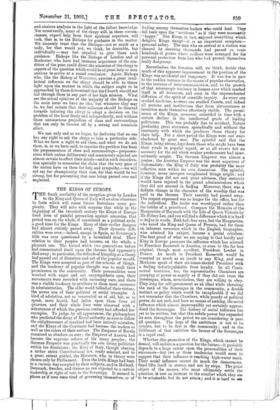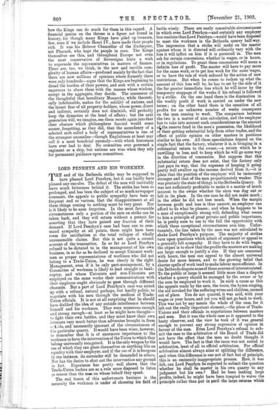THE KINGS OF ETTROPE.
TIRE frank cordiality of the reception given by London 1 to the King and Queen of Italy will awaken observers to facts which will cause future historians some per- plexity. They will note with surprise that whileS in the beginning of the twentieth century the Kings of Europe lived lives of painful precaution against assassins, that period was on the whole, if considered as a political cycle, a good time for the Kings. Many of their earlier dangers had almost entirely passed away. Their dynastic diffi- culties were over,—indeed, except in Spain, no Sovereign's title was ever questioned by a household rival. Their relation to their peoples had become, on the whole, a pleasant one. The hatred which two generations before had Concentrated itself upon the thrones had apparently died away ; in particular, the ridicule of kingship as a theory had passed out of literature and out of the popular mouth. The Kings were accepted as part of the scheme of things, and the tendency of popular thought was to exalt their prominence in the community. Their personalities were watched with eager and not unsympathetic eyes, their movements were recorded with unceasing care, and there was a visible tendency to attribute to them most successes in administration. The older world talked of their virtues, the newer one of their political or social triumphs: A kind of adulation, not so reverential as of old, but, so to speak, more liquid, had fallen upon them from all quarters, and their whole lives were observed with a minuteness of which the previous century had afforded few examples. To judge by all appearances, the philosophers who predicted the decay of Royal authority as sure to follow the enlightenment of mankind had been entirely mistaken, and the Kings of the Continent had become the leaders as well as the rulers of their nations. The Emperor of Russia remained as absolute as ever; the Emperor of Austria had become the supreme referee of his many peoples ; the German Emperor was practically the sole living politician within his dominions ; the King of Italy, though obeying a rather strict Constitutional law, really selected, and to a- great extent guided, the Ministers, who in theory were chosen only by Parliament. Even the little Kings had been Iii a curious way accepted by their subjects, and in Holland, Denmark, Sweden, and Greece no one objected to a certain leadership or right of veto in the Sovereign. It seemed in places 53 if men were tired of governing themselves, or of finding among themselves leaders who could lead. They fell back upon the " accidents " as if they were necessarily " happy." The Kings, in fact, enjoyed everything which delights Kings except—it is an important exception— personal safety. The man who on arrival at a station was cheered by shouting thousands had passed en. route hundreds of points where soldiers were arranged for his personal protection from foes who bad proved themselves really dangerous.
Nevertheless, the historian will, we think, decide that much of this apparent improvement in the position of the Kings was accidental and temporary. It was due in part to the sudden increase in the means of popular observation, to the increase of intercommunication, and to the growth of that microscopic tendency in human eyes which marked itself in all literature, and even in the unprecedented diffusion of the spirit of scientific inquiry. As every one studied medicine, so every one studied' Courts, and indeed all persons and institutions that from circumstance or intention made themselves effectively visible. The promi- nence of the Kings, moreover, coincided in time with a certain decline in the intellectual grade of leading politicians. This was probably due to accident, Nature producing great statesmen sporadically and without' the continuity with which she produces those thirsty for their help. For a short period the Kings were not over- shadowed by great men. The spiteful said that the Kings, being strong, kept down those who might have been their rivals in popular regard, or at all events felt no necessity for the aid which weaker predecessors had- inter- mittently sought. The German Emperor was almost a genius ; the Austrian Emperor was the most sagacious of diplomatists; the King of Italy was .probibly the most reflective man within his own dominions. The spiteful, however, never interpret complicated things aright ; and if the Kings did not seek great advisers, they certainly would have rejoiced in the grand administrators whom they did not succeed in finaiing. Moreover, there was a definite change in the character of the worship that was paid. to the thrones. Their sanctity had passed away. The respect expressed was no longer for the office, but for' the individual. The leader was worshipped rather than the holder of a priesthood. Compare the Memoirs orthe Margravine Of Bayreuth with the Life of Queen Victoria bY Mr. Sidney Lee, and you will find a difference which it is bard to def,.ne in words. Both had clear eyes, but the Margravine, Who hated the King and Queen of Prussia, had for them an inherent reverence which in the English biographer, who admired his subject, became a genial ciitieism: The best proof of what we are saying is that hardly any King in Europe possesses the influence which has accrued to President Roosevelt in America, or even to the far less original, though most excellent, President Loubet in France. An insult to President RooSevek would he resented as much as an insult to any King, and even Mexicans speak of their six-times-elected President with a feeling indistinguishable from loyalty. • In all Conti- nental countries, too, the representative Chambers are grasping at power as eagerly as if they did not trust the Sovereigns, whom, nevertheless, they are willing to obey. They long for self-government as an ideal while elevating the rank of the Sovereigns in the community, a' double instinct or policy which would be inexplicable if we did not remember that the Chambers, while greedy of political power, do not seek, and have no means of seeking, the social influence which almost imperceptibly yet certainly aggran- dised the Sovereigns. The history of social influence has yet to be written, but that this subtle power has expanded its area throughout the period we are considering is past all question. The hope of the ambitious is not to- be tyrants, but to be first in the community ; and to the fulfilment of that ambition the favour of the Sovereigns is a rapid road.
Whether this promotion of the Kings, which cannot be denied, will endure is a question for the future—it probably depends to a large extent upon the personalities of their successors—but two or three tendencies would seem to suggest that their influence is reaching high-water mirk. Their social influence cannot do much for democracies. Sand lifts itself in storms, and not by steps. The great object of the masses, who must ultimately settle the question, is now an increase in the comfort which they see to be attainable, but do not attain; and it is hard to see how the Kings can do much for them in this regard. A financial genius on the throne is a figure not found in history, for though many Kings have piled up treasure, few, even if we include Henri IV., have made their people rich. It was his Hebrew Chancellor of the Exchequer, not Pharaoh, who kept the people in corn. The Kings themselves see this, and throughout Europe not even the most conservative of Sovereigns hints a wish to supersede the representatives in matters of finance. There are, too, we think, in the new and terrible com- plexity of human affairs—produced mainly by the fact that there are now millions of opinions where formerly there were only hundreds—signs that the Kings are beginning to dread the burden of their powers, and seek with a certain eagerness to share them with the masses whose wisdom, except in the aggregate, they deride. The consensus of the thoughtful that hereditary Monarchy, while theoreti- cally indefensible, makes for the solidity of nations, and the latent fear of all property-holders, whose power, direct and indirect, certainly does not diminish, will probably keep the dynasties at the head of affairs ; but the next generation will, we imagine, see them recede again into that clear obscure which philosophers fancied would come sooner, forgetting. as they did, that the ascendency of a selected mob called a body of representatives is one of the strangest anomalies—though Englishmen at least may call it a most beneficial anomaly—with which historians have ever had to deal. No committee ever governed a regiment or a ship, but nations are wise when they rely for permanent 'guidance upon committees.



























































 Previous page
Previous page